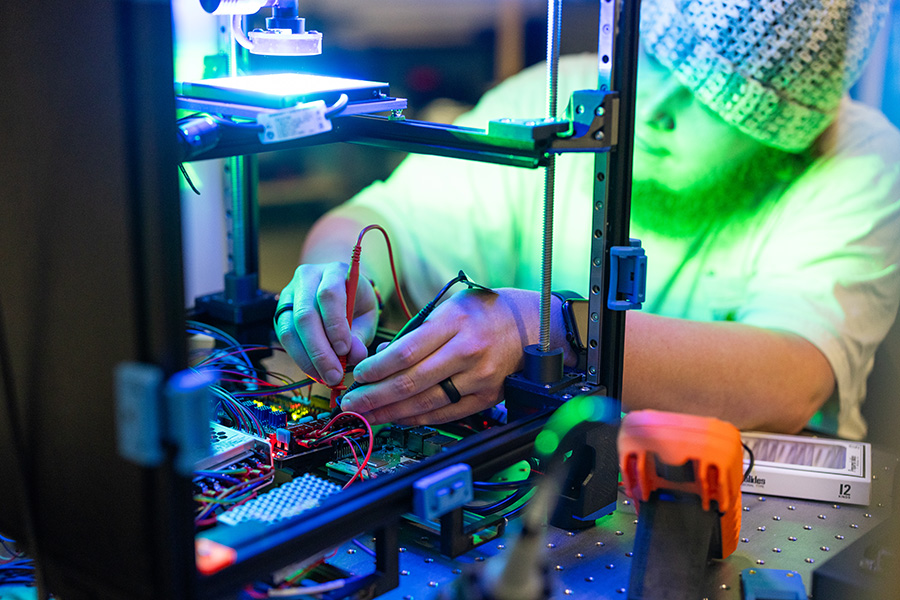The AI-enhanced robotic microscope will streamline parasite analysis in livestock, poultry.
ppalachian State University researcher Dr. Zachary Russell, assistant professor in the Department of Physics and Astronomy, has been awarded a $2.3 million grant from NCInnovation (NCI) to develop an AI-enhanced robotic microscope with the potential to advance North Carolina’s status as a national leader in agriculture.
Russell explained that the microscope he and his team are developing will radically reduce the time, expertise and cost needed to identify parasites in livestock and poultry, which stands to improve animal health, disease outbreak prevention and food safety.
“By advancing technology that supports our state’s farmers and strengthens food production systems, Dr. Russell and his research team will help fuel economic resilience and prosperity across North Carolina’s communities,” said App State Chancellor Heather Norris. “This investment recognizes the power of App State's applied research to deliver innovative solutions with a focus on real-world impact.”
The grant — the largest in this round of funding, as well as in NCI’s history — is part of $13.6 million in research and development funds NCI recently approved in support of 17 projects at North Carolina universities. The grant figures are preliminary and will not be final until contract agreements are signed.
NCInnovation is a nonprofit organization and public-private partnership that provides grant funding, mentorship and partnership development to support research and discoveries with practical and commercial potential at North Carolina’s public universities, with a goal to support economic growth and job creation across the state.
“My team and I are thrilled to be receiving such overwhelming support,” said Russell. “This funding will enable us to rapidly bring an incredible AI and robotics-enhanced microscope technology to market, which will let us serve a critical need of one of our state’s largest industries.”
The rollout of the robotic microscope aims to build the foundation for a corporation that will produce the devices in Western North Carolina and provide software development and product service, with a goal of creating rugged versions of the tool that can be used directly in the field, Russell said.
Co-principal investigators on the initiative are Dr. Mathieu Therezien, an affiliate faculty member in the Department of Physics and Astronomy, and Dr. Christopher Thaxton, professor in the Department of Physics and Astronomy.
“Zach and Mathieu have developed a proprietary and highly scalable technology with applications that go well beyond identifying and classifying fecal parasites in livestock,” said Thaxton. “By successfully tailoring this technology to meet the needs of North Carolina’s agricultural industry, we see potential pathways to broader commercialization across multiple markets, both within the state and nationally.”
Opportunities for economic growth, student research
“This significant level of funding from NCInnovation will provide opportunities to develop and roll out a tool that stands to generate jobs, provide student research opportunities and have an important, positive impact on our agricultural community,” said Dr. Christine Hendren, vice provost of research and innovation at App State. “Dr. Russell and his team exemplify the high quality of research and creativity that we are so proud of and that we aim to support in our App State faculty.”
Fecal parasites result in a 20% loss in many livestock sectors — a figure likely to increase due to the impacts of Hurricane Helene, according to Russell, who added that North Carolina ranks among the top states for livestock and poultry production in the U.S., contributing $7.4 billion annually.
Fecal analysis relies on manual processing and is time-consuming due to the need to have a trained expert examine each sample in a lab. The robotic microscope under development by Russell’s team overcomes limitations of traditional microscopy by using AI, automation and novel improvements in rapid image capture technology — advances that enhance image clarity and processing for easier, swifter and more accurate identification of parasites.
The App State research and development team is working with Pet Care Clinic of the High Country, area representatives from the N.C. Cooperative Extension, and the North Carolina Department of Agriculture and Consumer Services Veterinary Division to ensure the tool meets consumer needs and industry standards. The NCInnovation grant also includes funding to support a postdoctoral researcher, a research scientist and five student researchers for the project.
Additionally, the North Carolina School of Science and Mathematics in Morganton (NCSSM) received a subaward as part of the grant and will collaborate with the App State team to create a summer research and innovation program, during which NCSSM students will visit App State to assist with the initiative.
As one of seven regional NCInnovation hubs, App State assists researchers by connecting them with industry and business services, helping advance their research so it can become widely available and applicable for the marketplace.
Russell is the second App State faculty member to receive an NCInnovation grant. Dr. Rahman Tashakkori, the Lowe’s Distinguished Professor of Computer Science in the Department of Computer Science, was awarded over $640,000 in grant funding from NCInnovation in spring 2024 for his work on the Beemon Hive Monitoring System — an innovative tool for decreasing honeybee die-off and increasing hive production. This funding is helping to bring parts of the system to market that will assist beekeepers in preserving the health of their hives.
The robotic microscope project is a collaboration with Boone-based tech company Ion Innovations. Founded by Russell, the company has been providing App State students with summer internships and research experiences since moving to the area in 2020.
Source - https://today.appstate.edu













